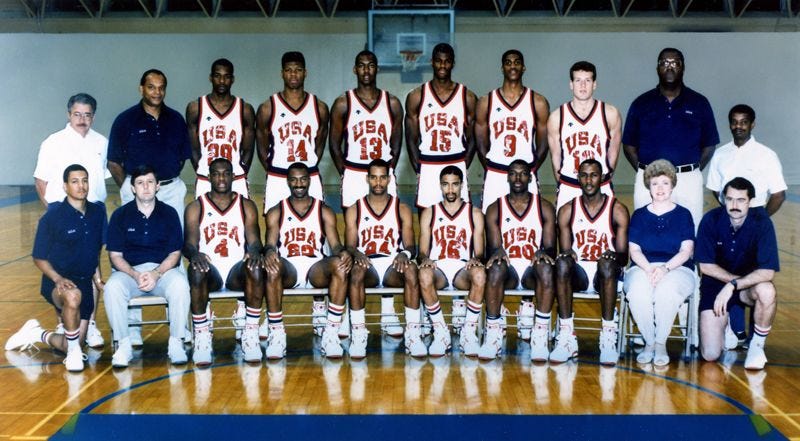The last amateurs of Team USA Basketball
The Americans' loss to the Soviet Union in the 1988 Seoul Olympics gave birth to the Dream Team. Here's the story of how that setback unfolded
For fans of a certain generation – present company included – there’s nothing particularly weird about watching the likes of LeBron James, Steph Curry and Kevin Durant draping themselves in red, white and blue and representing their company in the Olympics.
It’s how it has always been.
Though comparisons to the iconic 1992 Dream Team feel a bit strained, the United States men’s basketball team at the 2024 Paris Olympics is a special kind of loaded, a group teeming with so much talent that the 2023 NBA MVP and the leading scorer from the reigning NBA champions didn’t play a single minute in one of the team’s first two games.
The road that brought James, Curry, Durant and their nine other superstar teammates to Paris – and what lured Michael Jordan, Magic Johnson, Larry Bird, Charles Barkley, Shaquille O’Neal, Kobe Bryant, Dwyane Wade and dozens of other NBA standouts before them – was paved 36 years earlier in a different corner of the world.
Before there was the seemingly effortless and immeasurably cool triumph of the Dream Team, there was the struggle of the 1988 American Olympic men’s basketball team, the last group of college players to suit up for the US at the world’s most storied athletic competition.
There’s not a particular lesson to be drawn from the oft-forgotten (perhaps intentionally) 1988 squad. The idea of the top college basketball players competing in the Olympics rather than the NBA’s biggest collection of names is almost laughably quaint in 2024.
But nearly 40 years later, it’s worth looking back at how, exactly, we got here.
The prelude to a setback
Since James Naismith first hung a peach basket on the wall of a YMCA training school in western Massachusetts in 1891, basketball has been an endeavor of American excellence (even though it was a Canadian who invented the sport.)
That superiority has been most succinctly reflected in international play, where the United States has won the gold medal in 16 of the 19 Olympic games in which it participated. There’s an aura of inevitability that comes with that kind of track record. Though it’s a pursuit that’s statistically likely to end with a gold medal, playing basketball for Team USA in the Olympics is a bit of a thankless endeavor. If you win the gold medal, even by cartoonishly lopsided margins, you were supposed to do that. If you stumble and somehow lose, it’s a catastrophe worthy of national shame.
Heading into the 1988 Seoul Olympics, there was even more ample evidence than now for that mindset to exist. The Americans had not only won Olympic gold nine of the 10 times they had actually gone to the Games, but the lone exception – a loss to the Soviet Union in 1972 in Munich – was widely disregarded because of the game’s controversial, botched ending. The US was expected to win because it’s what it had always done.
With the weight of history planted on their backs, the US entered the 1988 Olympics looking to uphold those lofty standards.
Just four years earlier, an American team featuring Michael Jordan, Patrick Ewing and Chris Mullin coasted to a gold medal, winning all eight of its games by double digits, including a 96-65 rout of Spain in the championship.
By the time a team was being put together for the 1988 Games, though, things had changed. While its all-time Olympic record was still an immaculate 79-1, the US had suffered a series of setbacks in some of the less prestigious international tournaments. In 1987 alone, it lost in the World Junior Championship to Yugoslavia and Toni Kukoc. It fell again to Yugoslavia in the World University Games. In what was generally regarded as the most alarming defeat, it lost to Brazil in the 1987 Pan American Games after giving up 46 points to international basketball legend Oscar Schmidt. It wasn’t as if the US didn’t take those events seriously, either, as those teams were led by the likes of Mike Krzyzewski, Larry Brown and Denny Crum.
The Seoul Olympics, though, stood as a remedy to those woes, a chance for the Americans to reassert themselves as the dominant global basketball powerhouse with the rest of the world watching.
Keep reading with a 7-day free trial
Subscribe to The Front Porch to keep reading this post and get 7 days of free access to the full post archives.


